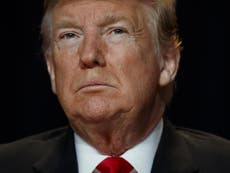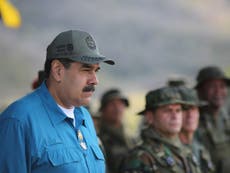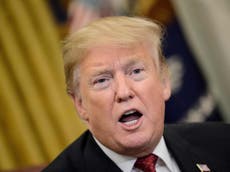The sad thing about Trump's summit with Kim Jong-un is it shows what could have been with Russia
The change that has come about in Asia has been welcome. Similar things could have been achieved in Europe, had we allowed Trump to treat Putin the way he treated his North Korean counterpart

The only surprise from Donald Trump’s delayed State of the Union address – beyond a few conciliatory gestures towards the Democrats who now control the House of Representatives – was the announcement of a second summit with the North Korean leader, Kim Jong-un. Even more surprising, perhaps, was that news of the meeting, which is less than three weeks away, had not leaked out before. While some news outlets had suggested the summit would take place in Vietnam a few days before the president’s address, the date had never been alluded to, with most assuming it would therefore happen months in the future.
Of course, there are good reasons why US officials, and Donald Trump in particular, would have wanted to keep the timing under wraps as long as possible. They start with the need to ensure that security and other arrangements would be adequate before settling on a venue. Then there is the choice of Vietnam, with Hanoi and Da Nang apparently competing for the honours.
In one way Vietnam makes for a neat counterpoint with Singapore where the first US-North Korea summit was held. Also in southeast Asia, it retains a communist regime yet with a large measure of the free market, and enjoys good relations with Pyongyang.
This makes it a relatively uncontroversial destination for Kim. On the other hand, the chequered US history with Vietnam does not make it an obviously congenial or comfortable place for an American president to visit. Bill Clinton was the first to break that taboo, but the unease remains, and misgivings from within the state department can well be imagined even today.
But the main reason for not advertising a new US-North Korea summit too soon – and for then presenting it in the State of the Union address pretty much as a fait accompli – is the ingrained hostility to such a meeting in Washington. Trump had to contend with all sorts of condemnation both before and after the rendezvous in Singapore – from talk of compromising US interests to accusations that even agreeing to meet Kim Jong-un could jeopardise regional security to claims of appeasing dictators and lending Kim and his regime an international legitimacy they do not deserve - and the critics are inevitably tuning up the second time around.
But Trump – to do him credit – refused to be swayed. He proceeded with that first meeting, which was intricately choreographed to present Kim as an equal, and undertook that there could be another. Now, despite Washington hawks warning that Kim has exploited Trump’s desire for a diplomatic success to forge ahead with his nuclear ambitions, it seems there will indeed be another full-dress summit at the end of this month.
What is more, for all the occasional verbal sabre-rattling on both sides, Trump was right when he boasted to congress that there had been no North Korean missile tests since the Singapore summit. And while opponents of a rapprochement – who doubt whether North Korea has been so quiescent – point out that there have also been no joint US-South Korean military exercises over the same period, there is justification for Trump here, too. As Barack Obama seems to have been the first US president to grasp, North Korea’s outbursts of nuclear belligerence tended to coincide with times when those joint military exercises were at their height, and may have reflected fear rather than aggression.
Leave aside what might be cause and what might be effect, however, and it should be hard to dismiss one central fact: the Korean Peninsula and its neighbourhood – from Japan to the Russian far east to northern China – have been considerably less tense since the Trump-Kim summit in Singapore than they were before. Not only have there been no North Korean missile tests, but there has been a lot more bilateral and multilateral talking. The priority now should be to ensure that there is no backsliding.
For those who might argue that at least some of the change can be attributed to attitudes in the current South Korean leadership, and President Moon Jae-in’s interest in a new détente, yes, that is true. But it is far from the whole story, and the question has to be whether any South Korean leader would have felt secure enough to engage with Pyongyang without some underpinning, at least, from the US.
Which brings us back to the awkward truth that Donald Trump dared to risk becoming the first US president to pick up on Kim’s clumsy overtures, and may – just may – have changed the political and security climate in that region for good. Whether the change is for the long term, or only temporary, perhaps what has been happening should also pose another question: How far was Donald Trump’s decision to engage with North Korea born of his frustration that his chief foreign policy ambition was blocked?
One of the few policy initiatives he voiced consistently during his campaign was his desire to improve relations with Russia. His thinking derived, it seemed, from two ideas: first, that Vladimir Putin could best be understood — and treated — as a leader who stoutly defended his country’s own national interests; and second, that if US-Russia relations were better, then a whole lot of other tensions might also be defused.
It could be argued that, in some ways, North Korea was a tougher nut to crack, in that there was no history of engagement or détente and Pyongyang remains poorly versed in the diplomatic ways of the world. On the other hand, Kim seems to have been desperate to bring North Korea out of the cold, and open to concessions, in a way Putin and Russia have not been. Being bigger, richer and vastly better armed, Russia can also make mischief with perhaps more impunity than Pyongyang ever could.
Yet the way in which Trump – with or without advice – approached North Korea, including his sensitivity towards Kim’s need not to be patronised, the highly contractual security bargain that appears to have been struck – no nuclear tests in exchange for no military exercises – and the almost immediate result in terms of a wider relaxation of tension might have applied almost as well as a playbook for Russia. Instead, what we are now looking at is the bilateral dismantling of the Cold War arms control regime, Nato and Russia staging ever bigger manoeuvres ever closer to each other’s borders, and even a return to competition for power and influence in third countries (Syria, Venezuela).
There are reasons, of course, why Trump’s hopes of a rapprochement with Russia have come to nothing. From the moment he was elected, pretty much the whole of the political and law enforcement establishment in Washington united to prevent it, and with respect to Russia policy, he has been very successfully “caged”. We will have to wait for the findings of Robert Mueller’s investigation to find out how far this has been justified.
But a consensus has already been formed in much of the US and the UK political establishments, and among some other constituencies in the western world, to the effect that Trump was at very least helped to his election victory by Russian interests, even if Trump himself did not go so far as actually to “collude”. Taken to a logical conclusion, that perception would regard Trump as a mortal danger to the US national interest, an enemy agent at the head of the administration.
As I say, we must await Mueller’s findings. But the evidence for collusion at any level seems to me (and to others) thin to vanishing. Indictments and trials so far have turned up only standard US lobbying crimes, such as money laundering and tax evasion.
Advertising and use of social media is minimal in the overall context of Facebook and others during the US election campaign. Even the dossier compiled by ex-MI6 officer, Chris Steele, with the express purpose of dishing the dirt on Trump could find no evidence of any business deals (e.g. Trump Tower) concluded with Moscow. It all looks far more like a Cold War construct designed to explain away Hillary Clinton’s (otherwise unthinkable) defeat, while also thwarting a central, and unwelcome, piece of Donald Trump’s agenda.
And to me, at least, the change that has come about on and around the Korean Peninsula as a direct result of Trump’s gamble in agreeing to meet Kim Jong-un comes with a tinge of regret. For it offers a glimpse of what might have been — in east-west relations and in prospects for European security – if Trump had been allowed to explore a similar rapprochement with Putin.
Alas, the time for such overtures is fast running out.





Join our commenting forum
Join thought-provoking conversations, follow other Independent readers and see their replies